Family and food: These are two things that are very important to our community and me here at Arbor Springs. So when I talk about food, I can’t help but think about it in the context of the work we do here to help you and your loved one connect.
The use of Montessori principles can profoundly affect those with Alzheimer’s and dementia, allowing them to reengage with their environment and activities. We practice these techniques every day here at Arbor Springs, but you can also apply them any time you are with your loved one. Engaging in properly planned and appropriate activities is so crucial for those with memory loss, be it in our community, at home, or anywhere else.
That’s why I’m excited to share some tips on how you can merge the Montessori Method with the joy of cooking. I hope that this post will help you combine these techniques with everyday cooking in a fun and beneficial way for everyone!
Remember why we’re here…
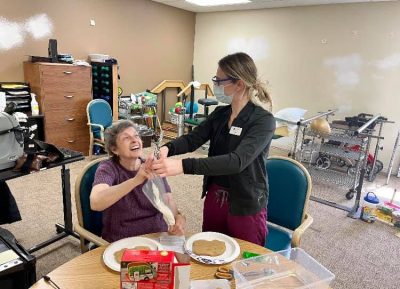
While I know how much I love a tasty meal, when you decide to cook with your loved one who is struggling with Alzheimer’s or dementia, the end product really isn’t always your primary concern.
With Montessori-based activities, we want to focus on an attainable end goal. This means you don’t have to worry too much about getting everything completely right, just about accomplishing the task together. Remember, it’s okay if the end product isn’t fine dining. The most important thing is to have a positive experience and have some fun while you’re at it!
If cooking a meal with your loved one is already sounding like too much of a challenge, here are some ideas for meal groups that might make things a little easier. Start your recipe search with these types of dishes:
- Pasta – Less chopping and dealing with meat or other ingredients that might be more difficult to handle.
- Salad – While there is some more cutting involved, salads are often easier to mix, and there are many short and fun steps in the process.
- Chicken – These types of dishes can be pretty straightforward, but you can have a lot of fun making sauces and seasoning, and even marinating.
Whatever you choose, make sure it is simple and doesn’t require skills, tools, or techniques you either don’t have or will be difficult for your loved one … or yourself. Remember to have your loved one help choose a fun recipe if they want!
Before you get started, make sure you set everything up…
Once you’ve found your recipe, there are some important things to consider before you get cooking. These will help set the stage for a positive experience with your loved one while employing Montessori principles.
- Get everything ready – Make your cooking easier by purchasing and organizing your ingredients beforehand. Reducing the barriers to completing tasks is a key Montessori technique.
- Get all of the equipment you need – Apart from simply making sure you have all that you need, lay these items out. They should be easily found and accessible. It might be a good idea to put the things your loved one will be using in a particular spot, separate from everything else.
- Ask if they would like to start – Before you begin, invite your loved one to join you. Even if they have said they want to cook with you, make sure they still want to participate after everything is ready to go.
Now, go ahead and get started…
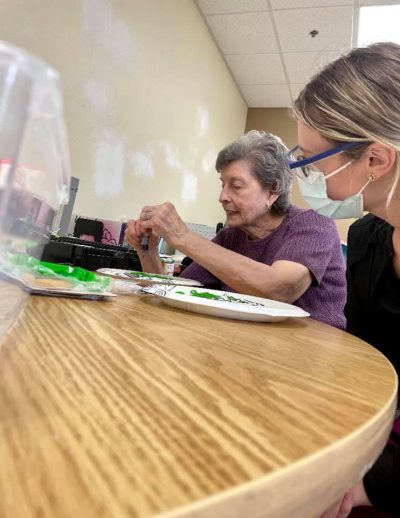 Have your loved one focus on more manageable tasks – Keeping tasks simple and straightforward makes them easier to complete. Activities with multiple steps and requirements can quickly become overwhelming.
Have your loved one focus on more manageable tasks – Keeping tasks simple and straightforward makes them easier to complete. Activities with multiple steps and requirements can quickly become overwhelming.- Set milestones – Break your activity into sections. Once you complete a milestone, tell your loved one how good they are doing and ask if they want to continue. It is vital that you allow time for breaks, so when you are doing something time-sensitive like cooking, make sure to plan ahead. Structuring tasks is an excellent tool in your Montessori toolbox and one we often use in our own activities.
- Communicate – Talk with your loved one about how they are doing, and make sure you answer all their questions. Even with more straightforward activities, it can be easy to get turned around.
- Check in with them – Be sure to lend a helping hand when necessary, and make sure no one is getting frustrated. Do this often and pay attention as much as you can.
- Give good feedback – Positive reinforcement is a fundamental part of the Montessori Method. It helps your loved one find the confidence to stay focused and excited about what they are doing.
- Remember to be safe – Cooking often involves some potential dangers. You should take charge of anything sharp, hot, or could otherwise hurt someone if left unattended or misused.
There’s more to it than just cooking…
Now that you’ve finished making your meal, there are still some things you can do with a Montessori twist:
- Set the table together – Activities like these are simple with easily achievable goals and great to do while you are waiting for your food to finish cooking, baking, setting, or whatever. To add a Montessori flare to this activity, invest in some different colored table settings. Matching colors with physical actions is very beneficial for the brain.
- Have everyone help clean up – Helping with easy cleaning chores is another way to engage your loved one’s mind with Montessori principles. Basic tasks like throwing away the unused food or putting the dirty dishes in the sink are great!
- Have a nice meal – While eating, make sure you connect with your loved one. Even if the conversation is sometimes difficult, it is essential and meaningful to engage with them. Often it is good to talk with them about what you’ve just done.
- Say thanks! – At the end of everything, thank your loved one for helping out; let them know how good a job they did and how much you enjoyed cooking with them.
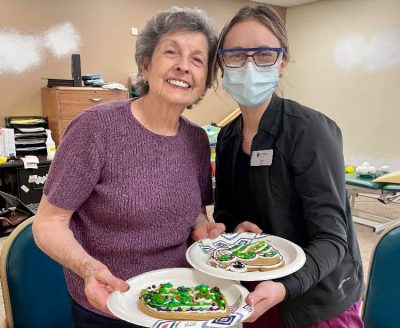 That’s all you need to infuse your cooking with a little Montessori-Based Dementia Programming, just like we do here at Arbor Springs. Doesn’t sound so bad, does it?
That’s all you need to infuse your cooking with a little Montessori-Based Dementia Programming, just like we do here at Arbor Springs. Doesn’t sound so bad, does it?
Over the next few posts, I’ll share some more activities we do here and how Montessori techniques can help you engage with your loved one struggling with Alzheimer’s or dementia.
If you would like to know more about how Montessori-Based Dementia Programming has positively impacted our community or additional information about the program itself, just reach out anytime. We are always available to answer your questions.

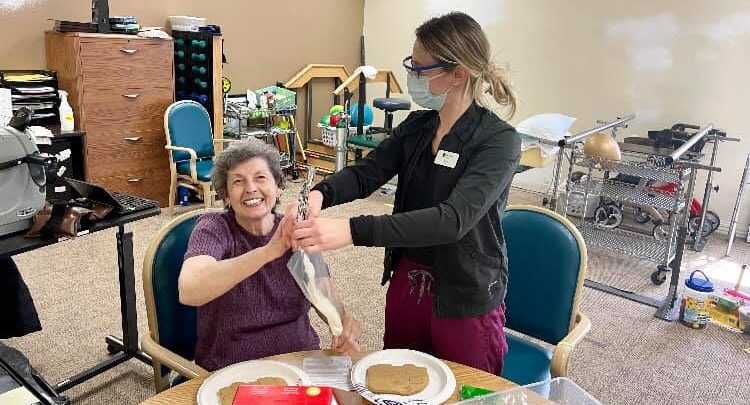
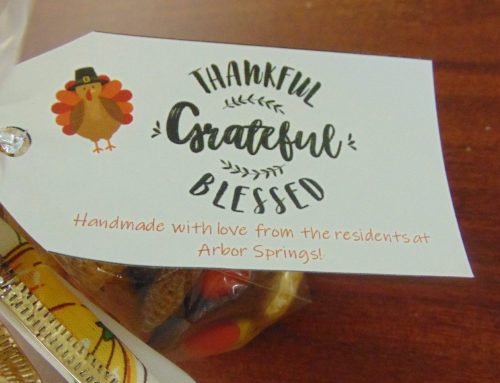
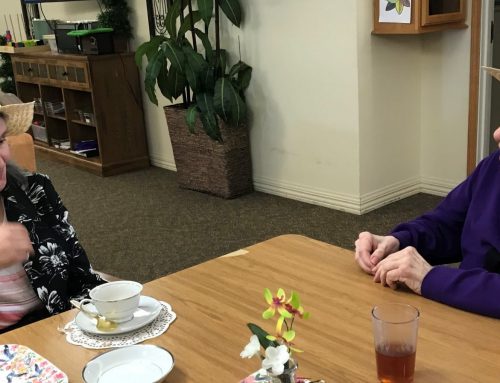

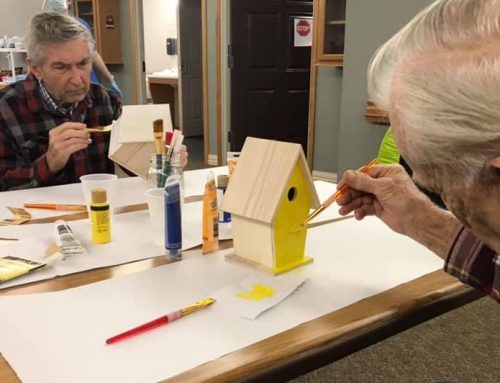

[…] you can do with your loved one. If you didn’t get a chance to check out our previous post on cooking with your loved one, take a look at it and have some […]